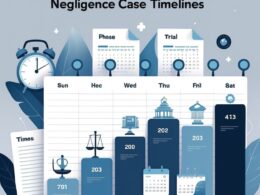When you or someone close to you suffers harm from medical mistakes, finding the right legal help is critical. Medical negligence cases are complicated and need lawyers who know both healthcare and the law.

The best law firms for medical negligence bring years of experience, a strong record of success, and teams of medical experts who know how to build a solid case. Top clinical negligence solicitors in the UK such as Howells Solicitors and Slee Blackwell Solicitors LLP get high marks from clients and show real results.
Choosing the right firm can make a huge difference in your claim. The best lawyers offer no-win-no-fee deals, work with medical experts, and know how to handle the legal maze so you get the most compensation with as little stress as possible.
Understanding Medical Negligence and Malpractice

Medical negligence happens when healthcare providers don’t meet accepted standards of care. Medical malpractice is the legal process for getting compensation if that negligence causes patient harm.
Understanding these ideas helps you figure out if you have a case. It also shows what part healthcare providers play in these situations.
Defining Medical Negligence and Medical Malpractice
Medical negligence means a provider failed to give care that meets professional standards. They either did something wrong or didn’t do something they should have.
Medical malpractice is when that negligence actually harms a patient. Not every mistake is malpractice—you have to prove certain legal points.
To win a medical malpractice case, you need to show four key parts:
| Legal Element | What You Must Show |
|---|---|
| Duty of Care | A doctor-patient relationship existed |
| Breach of Duty | The provider failed to meet standard care |
| Causation | The breach directly caused your injury |
| Damages | You suffered actual harm or losses |
The main differences between negligence and malpractice are about legal requirements and proof. Medical negligence covers any substandard care. Malpractice means that negligence caused real, measurable harm.
A bad outcome by itself isn’t malpractice. Medicine is risky, and sometimes things go wrong even when care is proper.
Types of Medical Malpractice Cases
Medical malpractice can happen in many ways. Misdiagnosis is one of the most common, whether it’s a delay, a wrong diagnosis, or missing a serious illness like cancer.
Surgical errors are another big category. These include operating on the wrong body part, leaving tools inside a patient, or mistakes during surgery.
Medication errors happen when the wrong drug or dose is given, or when doctors don’t check for dangerous drug interactions. Sometimes, it’s a pharmacy mistake or a breakdown in communication.
Birth injuries can affect mothers and babies before, during, or after delivery. Problems include not monitoring fetal distress, using delivery tools incorrectly, or waiting too long in emergencies.
Other common types include:
- Anesthesia errors in surgery
- Emergency room mistakes in busy hospitals
- Nursing home neglect for elderly patients
- Radiology errors in reading scans
Each kind of case needs specific medical knowledge. Some are more complex than others, depending on the specialty and the harm caused.
Role of the Healthcare Provider in Malpractice
Healthcare providers have legal duties to their patients. Every provider has to follow accepted standards of care for their field and situation.
Doctors need to use reasonable skill and judgment when diagnosing and treating. They should stay up to date, examine patients carefully, and make solid clinical decisions.
Hospitals have to make sure staff are qualified, facilities are safe, and policies protect patients.
Nurses must follow doctor’s orders, monitor patients, and report any changes. Nursing mistakes can also lead to serious cases.
Sometimes, more than one provider is responsible. For example, a surgeon, anesthesiologist, and hospital might all share blame for a surgical error.
Documentation is huge. Medical records show what happened or didn’t happen and are key evidence in these cases.
Expert witnesses help show what a reasonable provider would’ve done. They compare the defendant’s actions to professional standards.
Key Factors To Consider When Choosing a Law Firm

Picking the right medical malpractice attorney takes careful thought. Focus on lawyers with a real record of success and deep knowledge of medical law.
Your choice should be someone with board certifications and lots of experience with medical negligence claims.
Track Record and Case Outcomes
A lawyer’s track record shows if they can win compensation. Look for attorneys who share their results and settlement numbers.
Favorable verdicts show courtroom skill. Ask lawyers about their win rate in cases like yours. A good record includes both jury wins and settlements.
Check for case examples that match your situation. If your claim is about a surgical error, find someone who’s won those cases. Birth injury claims need different know-how than diagnostic mistakes.
Settlements can resolve things faster than trials. Your law firm should know how to negotiate with insurers and hospitals. Big settlements show the firm can build strong cases.
| Case Type | Average Settlement Range | Trial Success Rate |
|---|---|---|
| Surgical Errors | $500K – $2M | 65% |
| Misdiagnosis | $300K – $1M | 55% |
| Birth Injuries | $1M – $5M+ | 60% |
Expertise in Medical Malpractice Law
Medical malpractice law is tricky and needs a real understanding of both medicine and legal standards. Your attorney has to prove duty of care, breach, causation, and damages.
Pick lawyers who focus on medical negligence. General personal injury lawyers might not have the right knowledge for these cases.
Your lawyer should understand medical language and work with experts who can explain where care went wrong.
Choose firms that know how to handle different types of medical errors. These might include surgical mistakes, medication errors, and diagnostic failures.
Experience with medical records matters. Your lawyer should know how to get, read, and understand complex records.
Handling of Medical Malpractice Claims
The claims process has strict deadlines and lots of details. Your firm should handle these steps smoothly.
Most claims take 12 to 24 months to finish. The law firm should have resources to keep a case going, including money for expert witnesses.
Medical malpractice lawyers need to explain how they investigate. They gather evidence, talk to witnesses, and consult medical experts before filing.
Ask how they handle settlement talks. Many cases settle, but your lawyer should be ready to go to court if needed.
Communication is important. Your firm should update you regularly and explain legal news in plain language.
Board Certifications and Specializations
Board certification in medical malpractice law shows advanced training. Look for lawyers certified by respected legal organizations.
The American Board of Professional Liability Attorneys offers certification for medical malpractice lawyers. This means they have lots of experience and keep learning about medical negligence law.
State bar associations sometimes have specialization programs. These require lawyers to show they know their stuff.
Your medical malpractice attorney should belong to groups like the American Association for Justice. This shows they keep up with legal changes.
Some lawyers teach or write about medical malpractice law. That’s a sign of deep knowledge and respect from others.
Look for attorneys who attend conferences and keep up with new developments. The law changes, and your lawyer should stay current.
Evaluating Legal Strategies and Resources

The best medical negligence firms use focused strategies. They rely on expert witnesses, dig into medical records, and keep an eye on legal deadlines.
Use of Expert Testimony and Expert Witnesses
Expert testimony is at the heart of strong medical negligence cases. Top law firms work with medical professionals who can break down complex care for juries.
You need lawyers who bring in board-certified specialists for your type of case. These experts review your records and decide if the standard of care was missed.
Expert witnesses do two big things:
- Show what the right medical standard was
- Explain how the provider fell short
Good firms pick their experts with care. They want professionals with solid credentials and courtroom experience. The best experts know how to make complicated ideas simple.
Often, firms use more than one expert. One might focus on the mistake, another on the long-term effects.
Analysis of Medical Records and Procedures
A deep dive into medical records sets great firms apart. Skilled attorneys know how to spot missing info or inconsistencies that help your case.
Your legal team should get every record from all involved providers. That means hospital charts, nurse notes, lab results, and scans.
Medical procedures need to be checked against accepted protocols. Lawyers work with consultants to spot where care went off track.
The review process usually includes:
- Rebuilding the timeline of care
- Finding gaps in documentation
- Spotting communication breakdowns among staff
- Checking for policy violations in the facility
Strong firms might use timeline software and nurse consultants to organize everything. This helps them find the best arguments for your case.
Approach to Statute of Limitations and Case Timelines
Knowing the statute of limitations is crucial. Each state has its own deadlines for medical negligence claims.
Most states give you one to three years from when you found out about the injury. Some set a hard deadline no matter when you discovered it. State-specific rules can change your case strategy.
Statute of limitations rules can get tricky:
- Discovery rule means the clock starts when you learn about the injury
- Continuing treatment might give you more time
- Minors often have longer deadlines
Good firms move fast to save evidence and meet deadlines. They file well before time runs out.
Experienced lawyers also know about pre-lawsuit requirements. Some states want a certificate of merit before you can file. This document says a medical expert thinks your case is valid.
Understanding Fees, Costs, and Compensation

Most medical negligence lawyers work on a contingency fee basis. They usually charge 33 to 40 percent of any settlement or award you receive.
Knowing what damages you can recover, including pain and suffering compensation, helps you decide if you want to move forward with your case.
Contingency Fee Structure
Medical malpractice lawyers frequently collect a contingency fee between 33% and 40% of your total compensation. You don’t pay anything upfront.
How Contingency Fees Work:
- You only pay attorney fees if you win.
- The lawyer takes a percentage of your settlement or court award.
- Typical rates range from 33.33 to 40 percent.
- Some states set caps on attorney fee percentages.
The contingency fee arrangement means the lawyer only gets paid if you win your case. If you lose, you don’t owe attorney fees.
Additional Costs You May Pay:
- Court filing fees
- Expert witness fees
- Medical record costs
- Deposition expenses
These costs are separate from attorney fees. Some lawyers cover these expenses for you and then subtract them from your settlement if you win.
Damages, Pain and Suffering, and Recoverable Losses
Settlements often range from tens of thousands to millions of dollars, depending on the severity of the injury. Your compensation depends on a bunch of factors.
Economic Damages Include:
- Past and future medical bills
- Lost wages and earning capacity
- Rehabilitation costs
- Home care expenses
Non-Economic Damages Cover:
- Pain and suffering
- Emotional distress
- Loss of enjoyment of life
- Permanent disability or disfigurement
Pain and suffering compensation varies a lot. It depends on how badly the injury affects your daily life.
Factors like physical pain, emotional trauma, and changes in your relationships or activities all matter.
Factors Affecting Compensation Amount:
- Severity of injury or illness
- Long-term medical needs
- Age and life expectancy
- Income level and career impact
The Legal Process in Medical Negligence Cases

Medical malpractice claims follow a legal process that requires you to prove both a breach of the standard of care and a direct link between the provider’s actions and your injuries. Claims involving medical negligence are complex and often take years to resolve.
Initiating a Medical Malpractice Claim
You have to file your medical malpractice claim within strict deadlines called statutes of limitations. These time limits vary by state but usually range from one to three years after you discover the injury.
Your attorney starts by collecting all your medical records. This includes hospital charts, lab results, imaging, and nursing notes.
These documents form the foundation of your case. Next, medical experts review your records.
These specialists decide if your care fell below accepted medical standards. Without expert support, your claim can’t move forward.
Most states require an affidavit of merit before you file. This document confirms that a qualified medical professional believes malpractice happened.
Your lawyer submits this sworn statement with your complaint.
Key filing requirements include:
- Complete medical record collection
- Expert medical review
- Affidavit of merit (if required)
- Formal complaint filing
- Serving legal documents on defendants
Building a Strong Case: Standard of Care and Causation
You need to prove four things to win a medical malpractice case. Show there was duty, breach of duty, causation, and damages.
The standard of care is what a reasonably competent healthcare provider would do in a similar situation. Your medical experts explain what proper treatment should have looked like.
They compare the care you got to what’s considered standard.
Causation is often the hardest part. You have to show the medical error directly caused your injury or made things worse.
Healthcare providers might argue that your illness caused the complications, not their actions.
Evidence needed for strong cases:
- Expert witness testimony
- Medical literature supporting your position
- Timeline showing treatment decisions
- Documentation of resulting injuries
- Economic analysis of damages
Your legal team works with life care planners and economists to estimate future medical needs and lost earnings. This helps you claim all the compensation you’re owed.
What Sets the Best Law Firms Apart

The most successful medical negligence law firms stand out for two big reasons. Strong communication builds trust, and proven trial experience means your legal team can handle tough courtroom challenges.
Communication and Client Support
Top medical negligence firms focus on clear, consistent communication. You deserve updates on your case progress, legal developments, and settlement talks.
Key Communication Standards:
- Weekly case status updates
- 24-hour response time for urgent matters
- Plain English explanations of legal concepts
- Direct access to your attorney
The best medical negligence lawyers know these cases are emotional and financially stressful. They offer compassion but keep things professional.
Client Support Features:
- Dedicated case managers
- Flexible meeting schedules
- Phone, email, and video communication options
- Transparent fee structures
Your legal team should explain medical jargon and legal steps in ways that make sense. This openness helps you make informed decisions about settlements or going to trial.
Trial Experience and Jury Selection
Experienced trial attorneys know jury selection can decide case outcomes in medical negligence lawsuits. Your legal team needs to understand how jurors see medical professionals and complex evidence.
Critical Trial Skills:
- Jury psychology expertise
- Medical expert witness coordination
- Courtroom tech skills
- Cross-examination techniques
Top medical law firms hire attorneys with decades of courtroom experience. They know how to make complicated medical info relatable for everyday jurors.
Jury Selection Expertise:
- Spotting bias against medical professionals
- Picking jurors who understand scientific evidence
- Recognizing personal injury case prejudices
- Building diverse, fair panels
Your attorney should have a record of winning verdicts, not just settlements. Trial experience gives your legal team leverage during negotiations and confidence in court.
Frequently Asked Questions

Choosing the right medical malpractice law firm means knowing what to look for. Most top firms focus on case specialization, track records, and client outcomes.
What are the criteria for evaluating the best medical malpractice law firms?
You should assess experience, specialization, and success rate when you look at medical malpractice law firms. Pick attorneys who focus on medical negligence, not just general personal injury.
Experience with your specific type of case matters most. If you have a birth injury case, a firm with 15 years in that area will serve you better than a generalist.
Check the firm’s trial experience. Firms willing to go to trial often get better settlements.
Look at client testimonials and case results. The best firms share their verdicts and settlements.
How do I choose the top medical malpractice attorney in my area?
Start by researching how to choose a medical negligence lawyer from reliable sources. Focus on attorneys who regularly handle cases like yours.
Set up consultations with at least three attorneys. Ask about their experience and success rates with cases similar to yours.
Check their state bar standing and look for disciplinary actions. Most states offer this info online for free.
Ask about their fee structure upfront. Most medical malpractice attorneys work on contingency, usually taking about 33 percent of any settlement or verdict.
What distinguishes top medical malpractice law firms from others?
Top firms have medical experts on staff and often keep in-house medical consultants. This gives them an edge in understanding complex procedures and spotting negligence.
They know the right medical expert witnesses. These pros can explain tough medical issues to juries in plain language.
Leading firms spend significant resources on case preparation. Preparing a complex case for trial often costs $50,000 to $100,000 or more.
They win both settlements and trial verdicts. The best firms take on cases that others might turn down.
What are the success rates of the best medical malpractice law firms in the United States?
Medical malpractice cases have lower success rates than other personal injury cases. Only about 23 percent of these cases end in plaintiff victories at trial.
Many cases settle before trial. About 65 percent of medical malpractice cases with merit reach some sort of settlement.
Top firms usually have higher success rates because they screen cases carefully. They only take cases with strong evidence and significant damages.
The best firms may win 80 percent or more of their trial cases. This reflects their careful case selection.
How can I verify the reputation and experience of the best medical malpractice lawyers in Florida?
Check the Florida Bar website for licensing and disciplinary history. This database shows if an attorney has faced any professional sanctions.
Look at verdicts and settlements databases. Many Florida counties publish jury verdict info that shows attorney performance.
Search for board certifications in civil trial law or medical malpractice. The Florida Bar offers specialty certifications to qualified attorneys.
Check peer review ratings on legal directories like Martindale Hubbell or Super Lawyers. These ratings come from other attorneys in the field.
What are the typical outcomes of cases handled by top medical malpractice lawyers in South Florida?
Settlement amounts jump all over the map, honestly. Case details really drive the numbers.
Birth injury cases tend to bring in multi-million dollar settlements. Lifetime care costs push those numbers up fast.
Surgical error cases usually settle anywhere from hundreds of thousands to several million dollars. Severity of the injury and lost income make a huge difference.
Misdiagnosis cases can land smaller settlements. Unless the mistake involves cancer or heart issues, you’re probably looking at $500,000 to $2 million.
Most successful cases drag on for two to four years. If the case is complicated or there are several defendants, it can take even longer.











